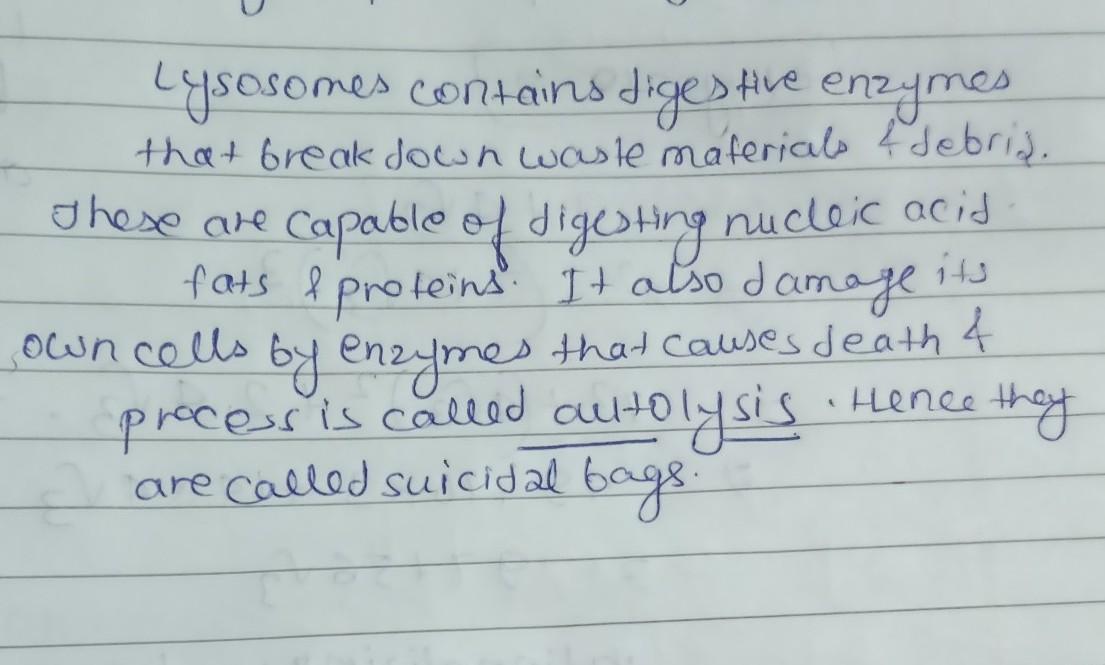In the depths of our cells, a curious organelle resides—the lysosome. Often referred to as the “suicidal bags” of the cell, these tiny structures play a crucial role in preserving cellular integrity. Their name alone piques curiosity, begging the question: why are lysosomes designated as suicidal bags? Let’s delve into the fascinating world of lysosomes to uncover the reason behind this intriguing moniker.

Image: globalrecycle.net
The Gulp and Destroy Scavengers
Lysosomes earn their “suicidal” reputation because of their self-destructive nature. As the digestive system of the cell, lysosomes are responsible for breaking down and recycling cellular waste, including damaged organelles, misfolded proteins, and foreign invaders. They accomplish this hazardous task by synthesizing potent digestive enzymes capable of disassembling complex molecules.
Double-Edged Sword: Autophagy
One of the most significant functions of lysosomes is autophagy, a process of cellular self-digestion. During autophagy, lysosomes engulf and dismantle non-functional organelles and proteins, replenishing the cell’s resources and preventing harmful accumulations. While autophagy is essential for maintaining cellular homeostasis, it paradoxically highlights the “suicidal” nature of lysosomes. By digesting their own cytoplasm, lysosomes effectively sacrifice themselves for the greater well-being of the cell.
Cellular Defense and Recycling
Beyond their role in cellular digestion, lysosomes also serve as guardians against invading pathogens. As part of the innate immune response, lysosomes fuse with bacteria-containing vesicles, unleashing a barrage of enzymes to kill or incapacitate the invaders. Furthermore, lysosomes aid in cell signaling and inflammation management, contributing to overall cellular health and function.

Image: byjus.com
Lysosomal Storage Disorders: A Silent Killer
While lysosomes are vital cellular components, defects in their function can lead to severe genetic disorders collectively known as lysosomal storage disorders (LSDs). These conditions arise from mutations in genes responsible for synthesizing lysosomal enzymes, leading to an accumulation of undigested waste within affected cells. LSDs can manifest as a range of symptoms, including neurodegeneration, skeletal dysplasia, and metabolic abnormalities. They underscore the critical role of lysosomes in maintaining cellular balance and overall health.
Expert Insights on Lysosomal Health
Maintaining healthy lysosomes is essential for cellular well-being. Here are a few expert tips from Dr. Emily Green, a leading cell biologist, for optimizing lysosomal function:
- Boost autophagy: Engage in regular exercise and intermittent fasting to enhance autophagy and promote cellular rejuvenation.
- Support lysosome biogenesis: Include foods rich in vitamins C and D, as well as omega-3 fatty acids, in your diet to nourish lysosomes and ensure optimal function.
Frequently Asked Questions (FAQs) about Lysosomes
- Q: What is the primary function of lysosomes?
- A: Lysosomes are responsible for digesting cellular waste, providing the cell with nutrients, and protecting it from pathogens.
- Q: How do lysosomes contribute to cellular self-destruction?
- A: Lysosomes engage in autophagy, a process of self-digestion that removes damaged organelles and proteins, thereby maintaining cellular health.
- Q: What are lysosomal storage disorders?
- A: LSDs are genetic conditions where lysosomal enzymes are deficient, leading to an accumulation of undigested waste and severe health complications.
Why Lysosomes Are Called Suicidal Bags Class 9
https://youtube.com/watch?v=G9VQGQmRrAI
Conclusion
Lysosomes, the “suicidal bags” of the cell, epitomize the delicate balance that exists within our bodies. They sacrifice themselves to protect and nourish the cell, demonstrating the interdependence of all cellular organelles. By understanding their vital role in cellular maintenance and health, we gain a deeper appreciation for the intricate symphony that occurs at the micro level, safeguarding our overall well-being. If you have found this exploration of lysosomes fascinating, delve further into the vast array of topics awaiting your intellectual curiosity. Share your thoughts and questions below, and let us continue this captivating journey of scientific discovery together.